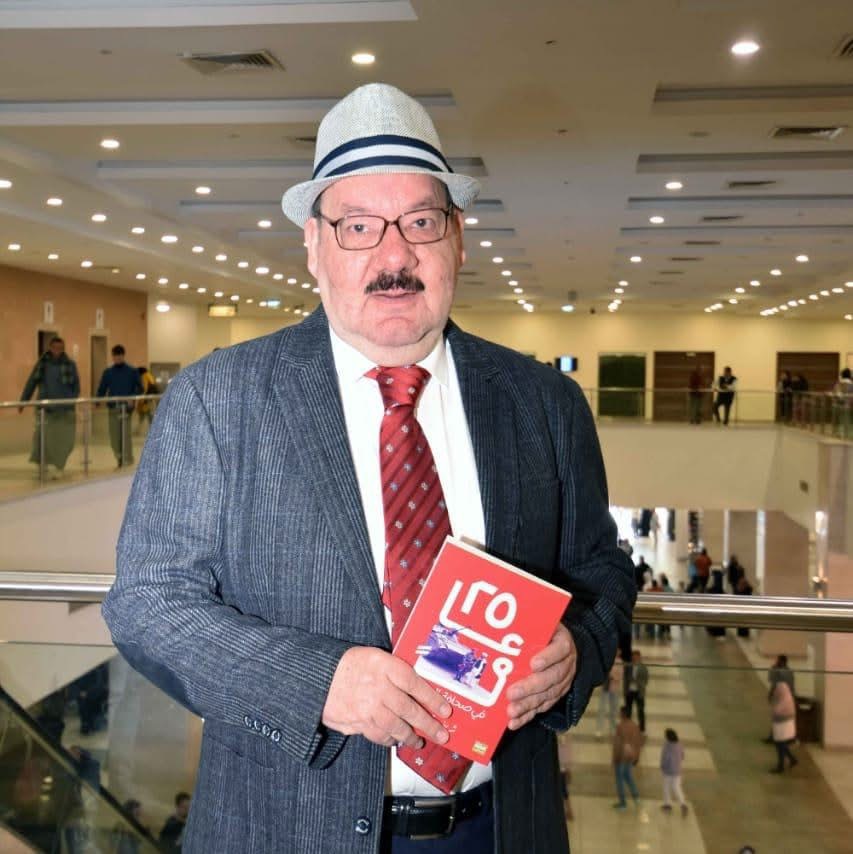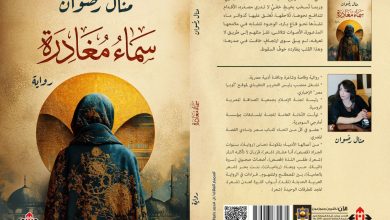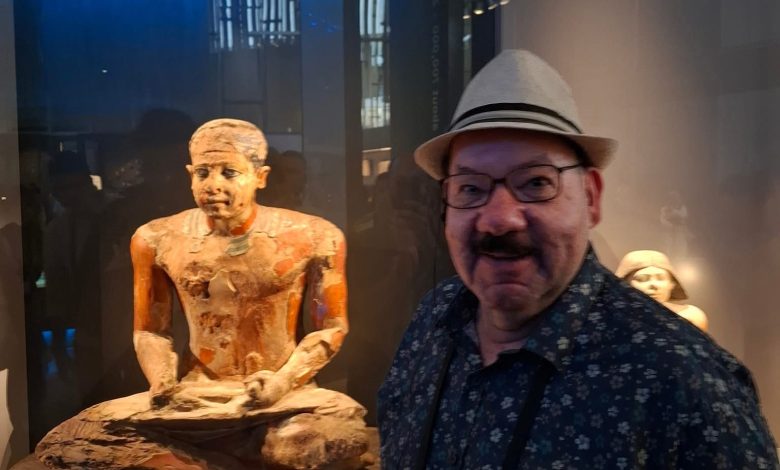
Sherif Kandil
Sherif Kandil, an Egyptian journalist born in 1960, has built a respected career marked by exclusive access and literary contribution. His membership in both the Egyptian and British Journalists’ Syndicates underscores his international professional standing. His acclaimed interview skills earned him the prestigious Arab Journalism Award. Beyond journalism, Kandil is a prolific writer, authoring books such as “Shadow, Departure, and the Nile” and “The Story of a Boy in the Gardens of Letters,” which showcase his narrative range from the political to the personal.
Translated into Arabic by Dr.Salwa Gouda
Dr Salwa Gouda is an accomplished Egyptian literary translator, critic, and academic affiliated with the English Language and Literature Department at Ain Shams University. Holding a PhD in English literature and criticism, Dr. Gouda pursued her education at both Ain Shams University and California State University, San Bernardino. She has authored several academic works, including Lectures in English Poetry and Introduction to Modern Literary Criticism, among others. Dr. Gouda also played a significant role in translating The Arab Encyclopedia for Pioneers, a comprehensive project featuring poets, philosophers, historians, and literary figures, conducted under the auspices of UNESCO. Recently, her poetry translations have been featured in a poetry anthology published by Alien Buddha Press in Arizona, USA. Her work has also appeared in numerous international literary magazines, further solidifying her contributions to the field of literary translation and criticism.
Egypt: The Next Chapter Starts Now
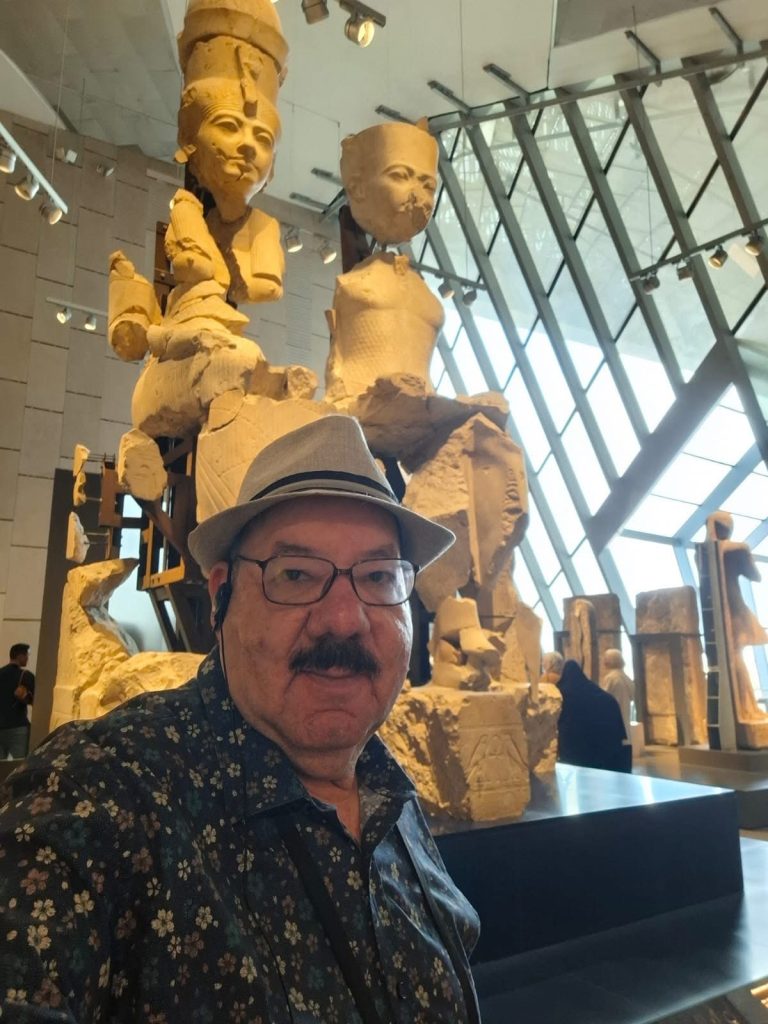
I
In short, it is a true pride for Egypt, and it is the most important and grandest event of the era.
I am talking about the new Egyptian Museum, which will be officially opened on the first of November.
I am talking about our ancestors: Ramses, Akhenaten, Menes, Tutankhamun, Hatshepsut, and Thutmose!
About a full day I spent there, swelling with pride over what has happened and is happening! About the genius of the location choice, and the fluidity of displaying the events of time.
I handled the situation as deserved! I tasked my son with arranging the trip, and I was keen to take my grandchildren with me! The entrance ticket was booked, and the guide’s fee was paid, as if I were coming from Europe, not from the Nile Delta! I returned to reading what I had written on paper, while feeling much anxiety. Oh, this restlessness! I try to remember all the faces I saw. They jostle in my memory, and I fear they might fade and burn out!
I had seen Grandfather “Ramses” the last time, about eight years ago, and back then I felt his face was reproaching or frowning. Here he returns, with his face radiant, despite the sun not aligning directly upon it. He stood tall and majestic, presenting his left foot, perhaps because it’s directly connected to the heart, or perhaps in adherence to military movement! I imagined him saying: I came to you from “Memphis”, then from “Ramses”, and here I return to you with the most splendid Egyptian appearance!
He reciprocated my pride in being present, and he asked me about the number of people coming to see him. He almost extended his hand to shake the hand of everyone who stood before him offering greetings!
He listened to me and watched me, while my face beamed, and I couldn’t count the number of visitors coming to see him. I imagined him whispering to all the loving, wandering faces: Make way for those coming from the Alps, and from the banks of the Rhine River, from Africa and Asia, from Australia and Latin America. Wake the sleeping people! I felt that his love for the numerous nationalities resided within him!
In the connecting corridor, or the passage to the halls, you will see the Pyramids as if they are, indeed they are, part of the scene. And by your grace and beauty, O Egypt -I swear to God- I have never witnessed. He asked me about Al-Faggala, Al-Shaghila, about traffic and flow, and I answered with all ease and simplicity: Praise be to God. Praise be to God. I repeated it in every hall, and in every corner and direction.
I began to gaze at the king, who was self-assured, where he wrote his name on the stairs 46 times, and I imagined him asking me about his old square, and whether its name had changed! I reassured him! Everyone who passes by asks about you. All of Egypt asks about you! The squares, the factories, the buses loaded with students, with hardworking laborers, and with soldiers!
He wasn’t awaiting the hour of the sun aligning on his face on the 21st of this October, as much as he was preoccupied with the question about people.. He asked me about the Nile, he who throughout his life “94 years” had been asking God about the timing of the flood! He asked me about the conditions of the journalists, the farmers, about the conditions of the craftsmen and merchants, and about the madness of prices. It was as if he knew everything about us! And it was as if he was calming our fears and reassuring us, and when he asked about the rest of the country’s affairs, I asked him about his family? He said with affection, pride, and love: I have a hundred daughters and sons. and we laughed from the heart!
He advised me on the manner of celebration and advised me to celebrate those coming from everywhere. Celebrate them all year long! He expressed his joy that his museum and everyone with it would generate billions, not millions. And if you want to celebrate me more and more, then celebrate the farmers, and the skilled craftsmen, all year long and for years to come.
I ascended the escalators, which transport us and move with us to the halls illuminated by the most beautiful civilization known to humankind..
“Ramses” took us back to 6,000 years before history.. God! How beautiful you are, O Egypt. How magnificent the place is!
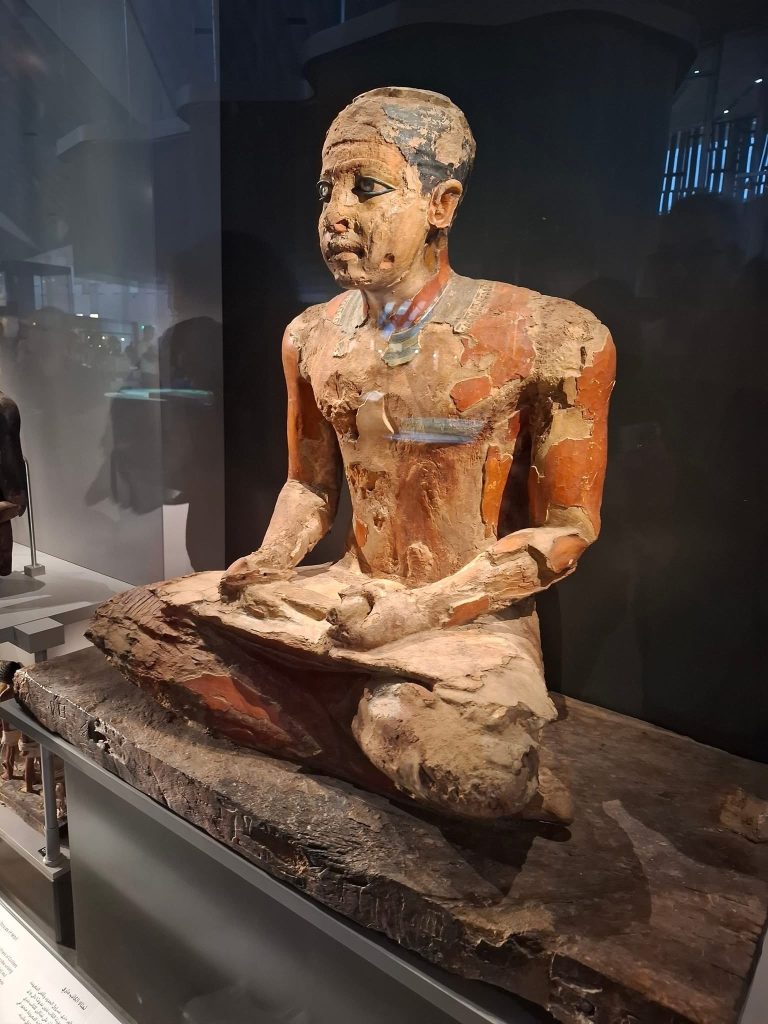
II
An amazing visit to the Queen of the Delta and Upper Egypt and a tender reproach from the King rising anew!
Across the great flowing stairway, whose surface area spans about 6,000 square meters, equivalent to 6 floors, lights emanate as I continue my journey: to offer the Queen my full apology! Our guide on this beautiful historical trip, Miss Sarah, had asked us as we approached: Do you think this statue is of a man or a woman? And because I know it well, I quickly said: It’s Queen Hatshepsut! Sarah laughed, and all the group members smiled, while I began to glorify God, the Almighty, the Majestic… I repeated the most beautiful hymns, overwhelmed by the stunning beauty of the sculpted form!
I knew that Hatshepsut was born in 1508 BC, that she was the eldest daughter of King Thutmose I, and I also knew that she received extensive education in ethics, proper conduct, in addition to reading, writing, arithmetic, and philosophy. The voice of my professor, Dr. Ezzat Qarni, echoed in my ear, and my memory traveled back to the lecture hall of the ‘Arts of Luxor’ faculty, just before Sarah asked: Which of you has visited the famous Temple of Hatshepsut at Deir el-Bahari?!
Scattered around Hatshepsut are other statues of some princes, and of her successor Thutmose III, and I am staring at her head as if it were a lighthouse, and at her face, filled with radiance and illumination.. Is there a statue in the world, thousands of years old, with such freshness, even lushness? Is there a statue in the world unaffected by wind, sun, cold, or humidity?! Here, my professor’s voice returned anew: She is the Daughter of the Sun, the Beloved of Amun, the Golden Horus, the Strong Lady, the Queen of the Delta and Upper Egypt.
I began to recall my journalistic trip to Somalia, as I listened to Sarah tell the group about Hatshepsut’s expedition to the land of Punt, and how the ambassadors came with wood, gold, trees, and incense… With great intelligence, Sarah skillfully avoided the talk of the ongoing controversy surrounding her disappearance, and the role of Thutmose III in it.
I was standing before Thutmose, whose father died in 1479 BC, leaving him his throne when he was no more than six years old, after which Queen Hatshepsut appointed herself as regent for the young king. After two years, she declared herself queen of the throne, and ruled for twenty years, and before she disappeared, she ensured her statue was in the form of a military leader! And immediately after the disappearance, Thutmose III ascended his father’s throne in 1455 BC, amid rumors that he had killed Hatshepsut?!
Thutmose III reproached me when he saw me engrossed in the topic of murder and controversy, without asking the guide, Sarah, about his glories! I said, I know them, O great leader, and I know your entire honorable record!
Yet, my admiration for Thutmose III did not prevent me from expressing my fascination with Hatshepsut, and so I escaped from Sarah… I felt she was a “constraint,” and headed towards the Queen once again, wanting to shake her hand, hand in hand! I was posing for a picture, repeating: Ah, O Lady of Thebes! Because of your great strength, you paid the price. You endured the talk and the rumors, and marched on, waving to the battalion!
I could have returned via the swift escalator, to rest in one of the charming cafés, or the international restaurants spread over an area of 1.6 thousand square meters… And I could have enjoyed once more, while on the escalator, contemplating about 87 massive artifacts, and I could have also sipped a cup of tea on the side of the commercial walkway, which has a surface area of about 2.5 thousand square meters, or likewise enjoyed browsing the display windows of 28 commercial shops, but I chose to stay to continue the most enjoyable trip!
Evening had begun to settle, I saw it from behind the balcony, as I was among the museum halls feeling a sense of familiarity! I wished I could ask the princes and kings residing in the museum, speaking of magnificence and beauty, about their condition when we leave them?! A man sitting behind the glass said: Don’t worry! When you leave and it’s time for us to sleep, we sleep. Those of us who are wakeful stroll through the pathways of immortality that you made for us, to traverse the void! And if news comes from you that angers us… we deliberately forget.. and everything returns as if it never was; so that life may continue… I left, having promised the man that I would return to talk about him… in a future episode!
III
I stood marveling at the masterpiece of the modern era, and the writing tools I saw, before a feeling of shame, even sadness, came over me! The Egyptian scribe, stationed behind the museum glass, who came from the depths of history nearly 3100 years ago, was staring into my face… I imagined him asking and reproaching me: Is it true that after all these years, you have formed committees that spawn other committees, which branch out into more committees; just to study the problem of the press and media?!
I pretended not to understand the question, but he scolded me again: And is it true that some members of these committees put their pictures on social media, asking people for congratulations and blessings on their appointment, not for their achievements on these committees?! My silence seemed to encourage him to continue, especially as he asked about what he had heard regarding people who contributed, one way or another, to devaluing the word and the meaning of media, and about others who gave employment cards to young people with no connection to writing, while withholding them from other “temporary” employees?! Then he also asked me about the talk concerning promotions, appointments, gifting of positions, musical chairs of posts, and memberships in councils, and on what basis are the gentlemen editors-in-chief and board chairmen being chosen now?!
I fled from before him in panic, while the guide kept repeating and elaborating, emphasizing that Egypt invented writing more than 3000 years ago, and that the kings placed the book right after the soldiers in defending the people, the homeland, and confronting all tribulations!
It seems the Egyptian scribe, lurking behind the glass for me, heard the guide, Sarah, saying to me: Why are you rushing to move away from the Hall of the Scribe and Writing, even though you are a journalist and a syndicate member?! I wish she hadn’t asked or said anything! The man behind the glass returned as if seized by fury, he who had remained silent for three thousand years: Has your situation really reached the point of forming committees?! And if you are -truly- a member of the Journalists’ Syndicate, even the British one too, why don’t you go and convey this talk to them?! I stammered: We have courses here in artificial intelligence, which brings everything ready-made “the word, production, and preparation”, and others in digitalization, a third in content, a fourth in means of communication, a fifth, a sixth, a seventh…! He said: I’m asking you about creativity, not execution… about research and writing, not indoctrination! About freedom of expression, and about values?! I said: I know! He said: And since you know, what is all this fuss about?!
I pretended to play the role of the innocent child, as he explained to me again: The problem, in short, is a blank sheet, or a white screen, a pure conscience, and a bold pen! I said, thanking, appreciating, and hurrying to get away from the hall: Sound words… sound words! But he kept thundering, throwing questions and examples: Is it true that the common denominator for most journalists has become asking about the date for the allowance payment?! And what about the level of reading?! Is it true that we have in Egypt members of parliament and the Shura Council who cannot recite the oath in correct language?! And did it really happen that congratulatory cards extended to include those who managed to read the oath without errors?!
I moved on, gesturing, or waving my hand, “And what business is it of yours for reading… and what business is it of mine about memberships in the Shura Council and Parliament? And why do you embarrass me and make me look like a reactionary, backward, spiteful, biased, envious person resentful of the gentlemen members of the committees?!
I pretended to contemplate the writing artifacts, while Sarah looked at me with glances not devoid of schadenfreude, as she explained how the ancient Egyptians invented hieroglyphic writing in 3400 BC, then invented paper, so writing spread. She took me back to the period of the Old Kingdom of Egypt, from the Fifth Dynasty, around 2450 – 2325 BC… I whispered: Thank God! I’ve had enough of what I heard today from the scribe stationed behind the glass! I had to sit on one of the beautiful marble benches, especially since I felt broken and defeated before the man behind the glass, due to his cunning and mean questions, while the hall before me seemed at times like a pearl, and at others like a grove…
I have visited the majority of the world’s museums, and I testify that none of them equals a quarter of our new historical museum… Not the Louvre in France, nor the German Museum, nor the British Museum in London. It is true that the first was built on the fortress of Philip Augustus in 1190 AD, and the latter is the oldest in construction, built in 1753 AD, but, the most beautiful thing about the Louvre is that they built it in the shape of the pyramid in Egypt, just as the most beautiful thing in the British Museum is that Egyptian archaeology section! The difference between us and them is that the contents of our museum date back more than 6000 years BC, and in the splendor of your civilization, O Egypt, my eyes have not seen the like across the length and breadth of continents and countries.
IV
Now I will dry my tears upon the stolen relics and Egypt’s lost obelisks!!
It is surely a coincidence, or let’s say it is the destiny that willed for Egypt to celebrate the inauguration of the masterpiece of the age, amidst the wave of anger sweeping France; due to the theft of artifacts from the Louvre Museum… I said: Glory be to God: They weep over the loss of a collection, or some artifacts, or pieces, and they say they are priceless, while our antiquities fill all the capitals and cities… I whispered: Egypt will remain the mine of blessings, which time cannot hide; because it – simply – is time itself.
Only now, can I, as an Egyptian, wipe away my tears, despite all that was stolen, plundered, or lost from me!
The three pyramids were radiating a light reflected on the faces of the visitors standing on the museum’s balcony, before continuing the tour in the halls of the great museum… I asked the young guide about the statue of King Khafre, made of green diorite, which embodies the power and status of the builder of the second pyramid? She said: It is in the Tahrir Museum, adding that the statue of Menkaure is here! He is the king who ruled in the Fourth Dynasty, 2436 BC, and built the smallest of the temples “the three pyramids”, 65 meters… here on the Giza plateau! I was almost moved to tears!
And it seems that from the multitude of European faces surrounding me from all sides, which in turn seized my memory, I was taken back to my tour in their capitals, where I exited ‘Piazza Barberini’ in Rome, heading to the ‘Vatican’, and when I finished my journalistic dialogue with the bishops responsible for the Middle East, and while I was standing for photographs in the vast square, I smelled the fragrant perfume of Egypt! I discovered that the towering obelisk in the square is Egyptian, seized by the Roman Emperor Caligula from its place in the city of Heliopolis, and sent it to Rome, then it was moved in the 16th century to St. Peter’s Square (now the Vatican) by order of Pope Sixtus V.
I felt then that the obelisk was staring into my eyes from atop its beautiful throne, entrusting me to speak of it, and of Egypt’s long history! I saw it casting its gaze over the square, hearing the fall of footsteps, and narrating what had happened and transpired, while it swallows the bitterness of exile and the harshness of days!
I traveled from Rome directly to France; to attend a conference in Paris, and in the evening I was standing in the Place de la Concorde, where the obelisk of Ramses II stands, which was transported from the entrance of the Luxor Temple in 1833. And despite the translation of the hieroglyphic text written on it, which says: ‘Ramses… the conqueror of all foreign peoples, the master of all who wear a crown, the warrior who defeated millions of opponents and enemies, to whom the whole world submitted, acknowledging his invincible power.’ Despite all that, I imagined it saying: Since that painful evening, I have been suffering sorrows and wandering in this barren void. I converse with the stars, and weep over the loss of our ancient glory!
I returned to London, and the next day, in the evening, I headed to the obelisk standing tall on the River Thames, which I knew early on was Egyptian, and that it was a gift from the ruler of Egypt, Muhammad Ali Pasha, to the government of England; to commemorate the victory of Commander Nelson over the French in the Battle of the Nile! I contemplated the scratches engraved on the obelisk, while I wiped my hand over it as if it were a living being! It had been hit by the German raids on London in the First World War, and the English chose to leave it like this; to bear witness to the heinous aggression against London!.
This time, I don’t know why I imagined its tears falling at sunset? And why I felt the magnitude of sorrow at dusk? I felt then that its wounds since the World War, no, since its relocation from its place in Alexandria, do not heal! I saw it dreaming of doves, resting securely upon it, while it sees the clouds almost touching its cheek!
My European tour ended, and as I was leaving the place, it was as if I heard it saying: Clear the way. O soldiers: let me embrace him, remove these shackles from me. Make way for this young man coming from my distant homeland. He wants. to chant the anthem: My homeland. my homeland. my homeland. for you are my love and my heart.
Now I stand in the heart of the Egyptian Museum, repeating, and my descendants repeat behind me:
I am an Egyptian, built by the one who built
The pyramid of eternity that has exhausted annihilation
The stance of the pyramids among us
For the vicissitudes of time is my stance
To you, O Egypt, safety
And peace, O my country
If time shoots its arrows
I ward them off with my heart
And may you remain safe at all times.
V
By God, my grandfather… if it were possible, I wouldn’t have left you…
Egypt has a date with history.
The truth is, when I looked intently… and when my heart embraced both imagination and sight… what I saw was not, indeed was no longer, mere stone! The faces and images changed in my view… I saw them extending their hands to us with roses, and at times with kisses… Did they feel joy like us? Did they feel pride like us?! We began exchanging surges of longing and nostalgia, the farther we went and the sound of the entering footsteps faded… The eyes that were stony, I saw them as rosy! And the mute, towering, colossal statue, I found it glancing at the visitors…
In the Egyptian Museum, King Amenhotep almost seemed to speak… I imagine him moving towards me… stopped only by the horizon’s wall! I sit on one of the hall benches from time to time… and I rise, exhilarated and wandering in stories of pride, monotheism, and supplication… The tales come one after another, and the halls retain the echo, the echo of ancient glory through the ages. I watch the great history stretching out proudly on the chests of the monotheist kings and the conquering princes…
Stories of struggle and love shine behind the stained-glass panes… and faces I thought were glowing and sparkling! Evening falls, and Isis dries her tears, so the rain flows and the moon illuminates… Our appointment is in the morning, when the sun rises and the bride will prepare herself…
Attention! “The Beautiful One Has Come”… this is the name of Nefertiti in the language of the ancient Egyptians… Nefertiti sits at the marble table, reproaching me because I ignored her when speaking of her husband Akhenaten! How could I ignore you, O Lady of Happiness, you who are the strongest of women born of ancient Egypt. How could I ignore your stance beside your great husband Akhenaten when he chose to proceed on the path of monotheism? I know they tried to erase your name and distort your image, but your half-statue, your face carved on a piece of limestone, never dies!
Perhaps now she hears the narratives and tales and sweet words… Perhaps in the stillness of the night, she holds the painful rituals of loss… Perhaps her servants come bearing the feast, perhaps she clears the table of futile rumors!
I glimpsed Princess Hathor, the princess of music, and a beautiful rhythm began… King Tutankhamun enters, and everyone stands to greet him, perhaps now he casts aside all the fabricated tales, perhaps he rejects all the embellished phrases, perhaps he throws away all the torn narratives… He wants to speak the truth after emerging from the ancient depths…
And here is his wife, Ankhesenamun, the young princess, spreads her handkerchief on the sky’s parchment, wrapping her torso around the evening’s mast… She speaks to the heads that emerge from their sarcophagi at night and tells them a long story…
I bid the place farewell… I bid farewell to the beauty, the imagination, the images, and the phantoms pass by the moon’s balcony… The corners pull me, attract me, implore me to stay the night… By God, grandfather, if it were possible, I wouldn’t have left you… if it were possible, I wouldn’t have gone!

